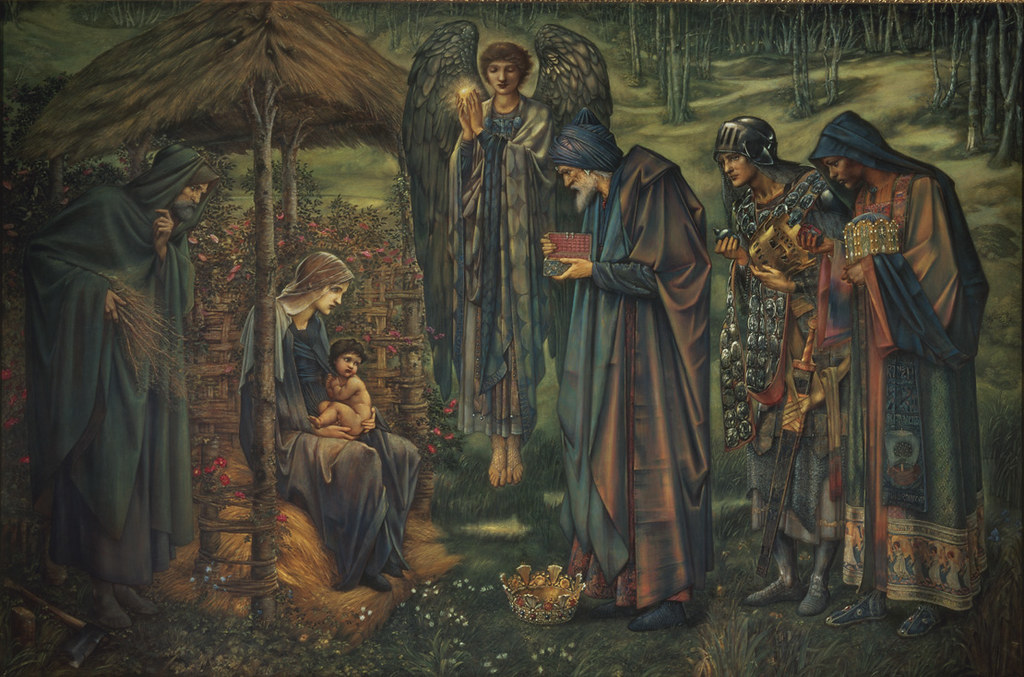*During this season of Epiphanytide, we are spending some time looking at the story of the Magi – specifically, highlighting the main characters: Jesus, Herod, & the Wise Men. They all have a lot to say to us today about power, status, politics, and the Christian life. See our previous posts (“Revelation & Reprisal” and “A Power-Crazed Megalomaniac vs. Jesus”) which will offer depth and context to this final installment.

So now we come to the final characters in this story, the wise men.
There may have been three, there may have been more. The Bible doesn’t tell us the number, yet since they brought three gifts of gold, frankincense, and myrrh, it’s been inferred that there were three. Maybe—the number doesn’t matter.
They are the wise men from the far east. Having been given the sign, they followed it and went a LONG way… hundreds of miles over rocks and desert and rising and falling terrain. It would have taken weeks, months probably to get to the king of the Jews. To quote TS Eliot in his famous poem, they would have had “a hard time of it.”
Now it might have been shorter if they were wise women… It’s been observed that what would have happened if it had been three Wise Women instead of three Wise Men? They would have asked directions, arrived on time, helped deliver the baby, cleaned the stable, made a casserole, and brought practical gifts, and Peace on Earth would have happened!
Well, maybe, but these are the wise men—the magi, or maybe the kings. All three titles work for various reasons. Magi is simply the plural of the literal Greek word magus, with Persian origins. It’s best translated as ‘wise men’—a particular role of advisors in a king’s court so that sometimes they are counted as royalty themselves. This role was common for a long time in the Ancient Near East, and these sorts of wise men showed up in Pharaoh’s court in Egypt and around King Nebuchadnezzar in Babylon, and show up in the book of Esther.
These three are most likely from Babylon, modern-day Iraq, and certainly are not Jews.
That matters. Even at the beginning of the story of Jesus, it signals that God is revealing himself to all people, not just one sort, not just one tribe, not just my tribe. God is the God of Jew and Gentile, which is another way to say that God’s blessings are for anybody, his revelation is for everybody, and Jesus is for anyone who would believe in him.
These wise men studied stars; they were astronomers. They saw something unusual in the sky, a star, or rather a star and two planets.
The famous star of Bethlehem was an arrangement of the planets Jupiter and Venus and the star we now call Regulus whose three orbits brought them so close together in the year 3 or 2 BC that they seemed to be one star in the sky, like it was burning. It’s a rare occurrence that professional astronomers tell us happens once every 38,000 years. Because of “Kepler’s Law of Planetary Motion,” this configuration could appear to move, and that’s what the wise men saw. Suffice it to say, science backs up the Star of Bethlehem.
It’s in the story of the wise men that we are given our response to Jesus this Epiphany, four of them.
First, they sought him.
“Where is he who has been born king of the Jews? For we saw his star when it rose and have come to worship him.” (v2)
They had seen a strange light in the night sky, took it as a sign, and intentionally set out on a long journey to find the King of the Jews.
It’s one thing to know about Jesus, it’s a whole other thing to seek him. To their shame, the chief priests and scribes of the Jews knew about the Messiah, but wouldn’t travel the 9 miles from Jerusalem to Bethlehem, whereas the magi who had already traveled over 700 miles went the distance, and they were rewarded. Beware of knowing about Jesus but not seeking Jesus.
Second, the wise men saw Jesus.
“They saw the child with his mother.” (v11)
They had eyes to see Jesus— not only in his physical realities as a baby but in his spiritual realities… this was the great King. Here is their Epiphany in the technical term… God was revealed to them.
Third, they worshipped him.
“They saw the child with Mary his mother, and they fell down and worshipped him.” (v11)
That is, they praised Jesus for who he was and is— the King. We do that every Sunday when we gather to sing songs to him and pray, and we can do that every day of the week. A good way to start a morning is to join that song, “Here I am to worship, here I am to bow down, here I am to say that you’re my God!”
Fourth and last, they gave him gifts.
“Then, opening their treasures, they offered him gifts—gold, frankincense, and myrrh.” (v11)
These gifts were costly and symbolic, recognizing Jesus as a King and foreshadowing his death. They inspire us to give costly gifts to Jesus as well.
So, brothers and sisters, it’s a new year, 2024. In the light of Epiphany, let me encourage each of us to make it a year following the example of the wise men.
Let us seek Jesus
Let us see Jesus
Let us worship Jesus
and Let us bring Jesus costly gifts.
Four words: Seek, See, Worship, Give.
I’ll close with this from Christina Rossetti, while still in the bleak midwinter…
What can I give him, poor as I am?
If I were a shepherd, I would bring a lamb;
if I were a Wise Man, I would do my part;
yet what I can I give him: give my heart.
